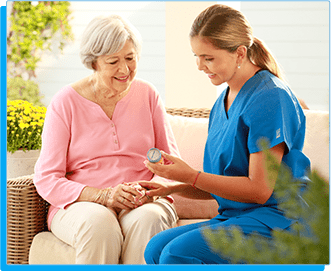
Healthy Habits For Seniors Dealing With Alzheimer’s
Taking care of a loved one with Alzheimer’s disease can be challenging but worth it, since you are doing everything in your power to help your family during this time, If you are looking for viable home health services.
Alzheimer’s, an irreversible disease that the Alzheimer’s Foundation of America says afflicts 5.1 million Americans, causes difficulty with your memory, self-care, and judgment abilities.
Home health services are vital for Alzheimer’s patients, and it offloads a lot of the responsibility from the families. They can take comfort in the fact that they are being catered to by a seasoned professional, with specialties in-home health services.
When the disease progresses, your loved one’s abilities may change, and helping them maintain healthy habits will become more essential over time. With that being said, there’s hope that healthy habits can enhance the quality of life for seniors that are dealing with this illness.
Follow these tips so that your loved ones can strive to be healthier while navigating through this transitional phase in their lives. There is no shame in seeking out elderly home care, knowing that it can bring your loved ones back from the brink of severe difficulty.
Healthy Diets for Senior Health Care
Proper nutrition is imperative for those enduring Alzheimers. When cognitive functions decline, eating regular healthy meals can become more taxing. If you are using senior health care services, this is one of many factors that they will be sure to emphasize to your loved ones.
Factors like forgetting to eat, having trouble with dietary choices, and having issues with your eating utensils, can all lead to poor nutrition and weight loss which can prompt erratic behavioral symptoms.
Either you or your senior health care aid can help promote quality nutrition by providing a balanced heart-healthy diet with a variety of foods, says the Alzheimer’s Association.
Offer foods like fruits, vegetables, whole grains, low-fat dairy products, and other forms of lean protein. Limit foods that are loaded with saturated fats, cholesterol, sugar, and sodium, and other kinds of processed foods.
Forming an Exercise Routine
Having a lifestyle that is centered around fitness can have a great impact on the well-being of seniors that are dealing with Alzheimer’s, and your caregivers for seniors can facilitate this necessity. Regular exercise has many benefits from decreasing the risk of disease to reducing falls but it can also benefit the brain by improving memory reasoning and judgment in people with mild Alzheimer’s disease.
In fact, according to research presented at last year’s Alzheimer’s Association International Conference, regular physical activity can not only prevent the disease and other forms of dementia, but it can enhance the quality of life for those who are enduring the trials and tribulations of the disease.
You and your caregiver for seniors can help entice them to get active and partake in enjoyable activities that are stimulating for your social and mental well-being. These include activities such as taking a walk with a friend, going to an exercise class, or dancing.
Social Engagement
Staying socially involved in physically and mentally stimulating activities can help seniors who are living with the illness stay happy and healthy, and it’s another element that your caregiver for seniors would recommend as well.
The Alzheimer’s Association and the professionals who work for elderly home care suggests that seniors who are actively engaging with friends will help to stimulate them on every level.
Volunteering within the community has also shown to provide many incentives such as increasing longevity and reestablishing your purpose in life, based on reports from the Greater Good Science Center, who are like-minded individuals like those who represent the best of best in elderly home care services.

Stimulation with Brain Games
To keep the neurons and synapses working the way that they are supposed to, your elderly home care aides need to help keep their minds active with brain-stimulating activities as recommended by the Alzheimer’s Association.
Brain games can include chess, word games, and crossword puzzles which can improve the health and function of your brain.
Preventing Falls and Accidents
As the CDC has noted, every single year, a third of seniors experience a fall. When employing elderly home care services, you can rely on their expertise to help you in preventing these kinds of things from occurring.
In people with Alzheimer’s cognitive and memory issues, and physical deconditioning, poor balance changes in walking, poor judgment, and visual impairment, can all increase the likelihood of an elderly person falling and sustaining serious injuries.
To ensure the safest environment for your loved one encourage regular exercise to improve strength and balance and to reduce falls.
Elderly Home Care Services like 24/7 Home care, acknowledges that you can reduce common trip and fall hazards by using bright lighting, eliminating certain risks, and implementing assistive bars in your bathrooms.
Incorporating healthy habits is beneficial to the physical and mental well-being of those who are plagued with this debilitating disease. Always coordinate with your family member’s doctor before beginning a new diet or exercise program.



